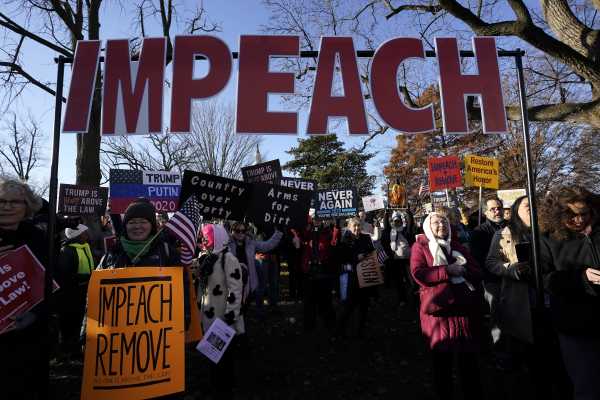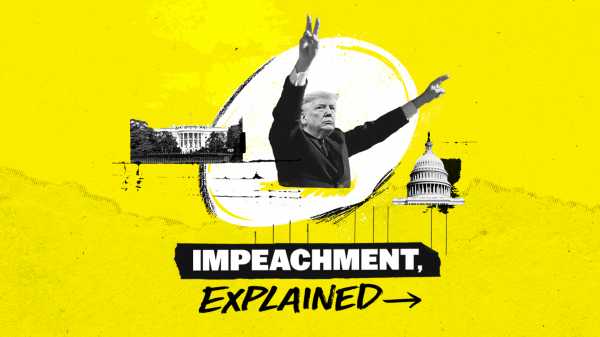
President Donald Trump deserved to be impeached over his conduct in the Ukraine affair. House Speaker Nancy Pelosi did the right thing by pushing for an impeachment vote, and Democrats (all but a handful of them) did the right thing by voting to impeach.
But not a single Republican did. And the GOP’s willingness to back the president to the hilt, in spite of clear and obvious evidence of abuses of power, speaks to an urgent threat to American democracy: Our constitutional system is ill-equipped to withstand extreme polarization.
The framers designed impeachment to be a check on a president who twists the office’s powers for public gain. The system only works, however, under the assumption that members of Congress — particularly in the Senate, which has the power to remove the president — will be capable of separating their interests from those of the president’s.
“Where else than in the Senate could have been found a tribunal sufficiently dignified, or sufficiently independent?” Alexander Hamilton wrote in Federalist 65. “What other body would be likely to feel CONFIDENCE ENOUGH IN ITS OWN SITUATION, to preserve, unawed and uninfluenced, the necessary impartiality between an INDIVIDUAL accused, and the REPRESENTATIVES OF THE PEOPLE, HIS ACCUSERS?”
The highly partisan House vote, and the universal assessment in Washington that the Senate will vote to acquit Trump on party lines, reveals that Hamilton’s assumptions about our institutions no longer hold true. Under conditions of extreme polarization, where at least one party cares more about defeating its political opponents than safeguarding against abuses of power, the impeachment power is neutered unless the president’s opposition has the House and a two-thirds majority in the Senate (an extremely unlikely set of circumstances).
Impeachment is the main remedy for presidential misbehavior in the Constitution. Its failure means the constitutional system has failed to protect itself. And the consequences for American democracy could be profoundly dire.
“The level of polarization and extremist behavior is such that our Madisonian institutions are completely dysfunctional,” says Steven Levitsky, a Harvard professor and coauthor of How Democracies Die. “No institutional design is likely to perform well, or perhaps even survive, this level of polarization.”
The impeachment vote reveals why our polarization is so dangerous
The fact of polarization in the United States, of both major parties and their voters moving toward their ideological flanks rather than to the center, is well-established. Democrats have moved to the left, while Republicans have moved (much further) to the right; complaining about this state of affairs is a staple of modern punditry. Often times, these complaints amount to a kind of unrealistic centrism: a lament that the two parties just can’t get together and agree on “common sense” solution to policy issues on which they have fundamental, principled disagreements.
But there’s a difference between normal polarization and what Georgia State University political scientist Jennifer McCoy calls “pernicious polarization.” This type of deep polarization, she explains, extends beyond policy disagreements down to the level of identity: where the two camps start to see the other side as not merely a political opponent, but an existential threat to the American way of life.
In the US, this afflicts both parties — but in a deeply asymmetric way. Republican belief in the evils of Democrats are so deep that they are quite willing to do profoundly anti-democratic things, such as use the powers of state and federal offices to suppress Democratic votes, or look past a president’s misdeeds in order to keep Democrats from winning.
“We can’t remove ourselves from that [sense of] belonging with each camp, that identity with each camp, that makes us view things in a very partisan way,” McCoy says. “The societies that can withstand such deep polarization [use] their democratic and constitutional principles to deal with any executive abuse of power. They can survive.”
McCoy cites the recent impeachment of South Korean President Park Geun-hye as a model. Park, the daughter of former dictator Park Chung-hee, won office in 2012 amid deep and widening divides inside the South Korean electorate. After evidence of her abuse of power to funnel money and business-relevant classified documents to one of her associates emerged in 2016, she was successfully impeached by a 234-56 margin (and then arrested shortly after being removed from office).
Trump’s abuses of power, are if, anything more severe than Park’s. He wasn’t merely acting corruptly — he does that all the time — but actively undermining the integrity of the 2020 election and thus the health of the democratic system. He was acting corruptly and undemocratically.
Yet polarization is so pernicious in the US that a vote holding him accountable for his actions has fallen strictly along party lines. Only a handful of Democrats voted against the articles, and not a single Republican crossed over to vote for them. (Rep. Justin Amash, an independent, left the Republican Party in July.) Republican members of Congress simply cannot imagine breaking with this president, either because they sincerely believe Democrats are worse, or they’re afraid of their voters who do think that.

This effect is why a Senate acquittal seems overwhelmingly likely — and why experts on democracy are so afraid for the American system’s health. Trump has displayed over and over again that he cares little for the principles of liberal democracy. He abuses his office for personal gain, gleefully scapegoats ethnic and religious minorities, describes the opposition as treasonous, and labels the free press enemies of the people. With near-absolute backing from the Republican Party, an emboldened Trump is poised to keep doing what he’s doing — or worse.
“Trump is, by American standards, a pretty uniquely authoritarian figure. Much like many of the Latin American autocrats I’ve studied the last 30 years, his instinct is to deploy the state for his own personal and political advantage,” Levitsky says. “The Republican Party has, in this particular case, lined itself up [behind] Trump’s efforts to use the powers of the presidency to bully a foreign nation to intervene in the 2020 elections — pretty authoritarian behavior.”
Your guide to the Donald Trump impeachment saga

Understand the impeachment process, from its history to what comes next. Explore the full guide here.
None of this is to say that pursuing impeachment was a bad idea on Democrats’ part. Both Levitsky and McCoy think it was probably necessary, if only for Democrats to show that they’re taking their institutional responsibilities to check Trump’s behavior seriously.
But that doesn’t mean it was a good option, either. The truth is that, under these circumstances, Democrats don’t have a good option. The GOP has revealed itself to be so far gone — through undemocratic behaviors that go far beyond Trump — that the only viable remedy appears to be defeating the party at the ballot box.
And that too might fail. Trump has a decent shot at reelection, and the Senate map is deeply biased in favor of the GOP. So the question impeachment raises is this: If the effort to hold Trump accountable fails, and the 2020 election isn’t enough to break the Republican fever, what can Americans do to safeguard their democracy in the long run?
Sourse: vox.com






